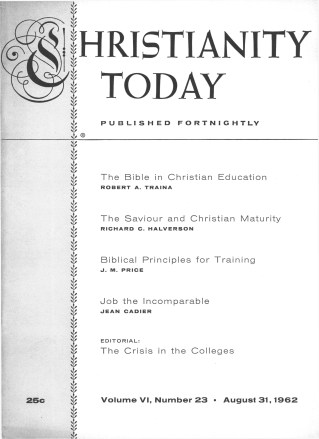Technical training of astronauts is relatively rapid. A youth’s development into manhood is a far longer, and yes, far more awesome process.
It begins with God’s creation of a life. It continues with the birth of a baby with potential either to bless or to curse his Maker, to fulfill or deny his responsibility to society.
Children are, indeed, an heritage of the Lord, and among a nation’s choicest resources. This treasure includes handicapped children—the mentally retarded as well as the physically limited. Too often the church has overlooked the crippled, epileptic, blind, deaf, spastic and other handicapped youngsters. Too long we have failed the mentally retarded of whom approximately 300,000 are born each year in the United States alone.
This treasure of human resources includes also the gifted child (I.Q. of 133 and above). Inadequate or improper direction and care often has short-circuited his abilities into assorted problems for himself and for others. All of these—handicapped and gifted—are named “exceptional” because they deserve special education for specific potential and needs.
Throughout the United States some 6,117,798 such exceptional children will need special education in 1963 according to estimates by the Department of Health, Education, and Welfare. (Statistics elsewhere around the world would, no doubt, be equally sobering.) These youngsters reach out for satisfying experiences in family, church, and community life. Not only parents, but pastors and lay leaders as well, must cultivate the means and methods whereby the exceptional can truly live to the glory of God.
While increasing numbers of churches are augmenting and adapting their work to meet the needs of the handicapped and gifted, many more need to show active concern. Here is a wide open door to an effectual ministry, one showing the perspective and power of the Gospel.
Such a ministry requires use of knowledge and understanding in specialized areas. Secular sources have contributed much information concerning exceptional children: it is not to be viewed askance. Physiological and other purely scientific data is essential to proper diagnosis, without which helpful mental, social, emotional, physical, and often even spiritual guidance of such boys and girls cannot proceed successfully. Special equipment may be needed, as well as materials and methods adapted to this learning and teaching. The church should be aware of the technical orientation and assistance offered by tax-supported and private agencies; assistance which she herself is in no position to provide, financially or otherwise.
Available materials concern themselves also with the parents and associates of exceptional children, they describe personal relationships in various environments. Instruction for preventing, as well as for recognizing and meeting problems in children is important, too. And in the church, no less than in society at large, both “normal” and exceptional persons often need help in acceptance of and respect for others, as individuals.
The attached bibliography is diverse in content and approach. Obviously, not all materials on the subject are of equal importance to all persons in all situations. Additional references could be cited, too, for an encouraging upturn in interest is apparent today.










